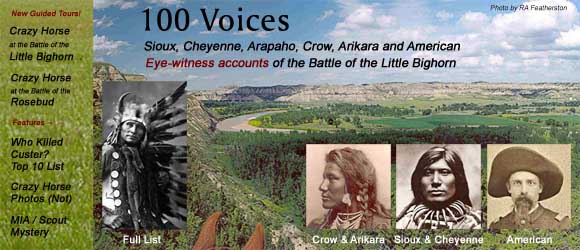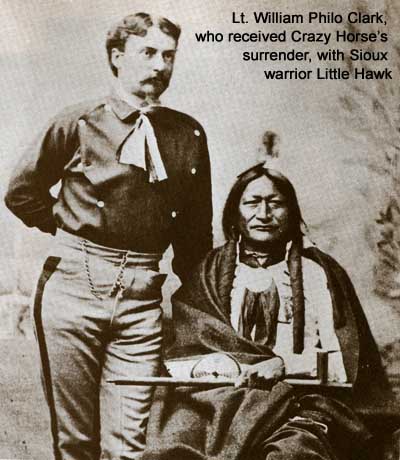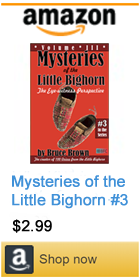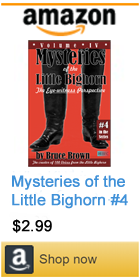|
||||||||||||
Bruce Brown's 100 Voices... The Surrender of Crazy Horse
THE END OF THE SIOUX WAR
Crazy Horse advanced entirely alone to meet Lieut. Clark, and, after proceeding several rods, sat down upon the ground and awaited the coming of that young officer, who immediately followed this example. Crazy Horse then arose, and moving slowly over the distance which separated them, shook hands but said nothing. Subsequently a council was held, in which Red Cloud was chief spokesman for Crazy Horse, who continued to maintain his singular silence. The former stated for him that neither Crazy Horse nor his warriors were defeated or cowed into submission, but that he deemed it best as a matter of policy to surrender, and that they acquiesced in this as they would have in any decision he made. From 1,000 to 1,500 bucks, squaws, and papooses surrendered, 500 of which were warriors. Twenty-two hundred ponies, in fine order, were turned in, but only 147 arms were received, most ofwhich were, however, first-rate sporting rifles or else Springfield carbines, calibre 45, the same as now issued to United States troops. Beyond doubt the remainder of their arms were cached in some secure retreat, where they can be readily obtained in an emergency. Crazy Horse had not been to an agency on foot for twelve years, his last visit to any settlement having been made to this post. His proud and almost contemptuous behavior chafes the impatient Col. MacKenzie, who ill brooks the peaceable surrender of Custer's brutal butchers. He thinks that Crazy Horse would be benefited by a dose of the Camp Robinson guard house, and the excercise afforded by attending upon the post water wagon-and so expresses himself. The Indian villages, and particularly those of the Arapahoes and Cheyennes, that were in the vicinity of Crazy Horse's camp, have marched further away through positive fear of that wily and moody chief. The Cheyennes, indeed, have borne the brunt of the war, and were in a perfectly destitute condition when they arrived at the agency. They say they have had enough of fighting for the rest of their lives. The utmost good feeling prevails between the troops and the Indians, the latter having abandoned the insolent and defiant attitude they had always before assumed when in force at the agency. Sitting Bull is reported north of the Yellowstone, and attempting the crossing of the Missouri river, now at its spring flood. The Seventh Cavalry is endeavoring to intercept him. Otherwise, but forty lodges of hostiles remain unaccounted for, and troops will probably scour the country in their pursuit as soon as the grass will sustain their horses. The Fourth Cavalry expects to march to Leavenworth in about two weeks, and companies of the Third, in that event, will probably replace them. "The war is over," says everybody, and the late hostiles are going to commence farming operations in a few days. This fact is significant, as it does not indicate their removal to the Missouri river this spring, as was anticipated. Strange to say, the ponies surrendered by the different bands that have submitted, are to be retained by them or given to the friendly Sioux who have remained at the agency. It makes little difference. Community of goods and equalization of property are strong points among Indians generally, and there is little doubt that most of these animals will again find their way into the hands of their original possessors. Except for hunting and the war path, ponies are of little use to the Sioux. Few of them are taken to work in harness, and they are too small for this purpose. Neither are they suitable for farming. They should be converted into mules, or else sold at auction, and the proceeds utilized for the benefit of the Indians. Properly speaking, they should accrue to the Goverment to reimburse it for war expenditures, or else be used to satisfy properly authenticated claims of frontiersmen who have lost stock by Indian depredations. The Sioux possess a great many ponies, and they would sell readily to ranchmen. Their appropriation might be reduced no inconsiderable amount thereby, or the regular annuities (blankets, wagons, harness, agricultural implements, ect.) be increased. Anything would be better than the choice apparently made. It is recommended that one or two regiments of Indian scouts be mounted upon them and employed by the Government. The plan is a perfectly feasible and a good one; but even then there would remain a large surplus of horse flesh. Cen. Crook is expected at the agencies to attend a grand council and peace dance that is to occur shortly, and his presence may materially alter the disposition proposed to be made of these ponies. Dismounted, the Sioux can never again be formidable foes to the Government; but if permitted to retain their wiry and courageous little beasts, there is not the slightest doubt in the general border mind that the armywill be pursuing these same Sioux next year if not sooner. Here is an incident peculiarly characteristic of the Indian. When it was ascertained that Crazy Horse was approaching the agency to surrender, Lieut. [J. Wesley] Rosenquest of the Fourth Cavalry was sent with an escort and train loaded with rations to meet him. He was warmly welcomed by the hungry Sioux, many of whose stomachs had long been unacquainted with Uncle Sam's sugar, tea and hard tack, and they immediately went into camp. They would proceed no further, and that night and the next day they ate ravenously and without intermission, until all the rations were consumed. During two more days and nights they refused to stir, notwithstanding the protestations of the young officer at their delay, and [they] sluggishly remained in camp, their overladen stomachs slowly digesting the unusual-[illegible]. At last they moved. Near the agency a fright ensued, consequent upon the discovery by a party of young bucks in advance, of a large herd of antelope. Naturally suspicious, the rapid firing in the distance aroused their utmost fears, and supposing that they were attacked by the troops, the main body, and particularly the women, children, dogs, and ponies regularly stampeded, and took shelter among the neighboring bluffs. It was some time before quiet was restored and the scattered village collected. There were many handsome squaws among them. The Death of Crazy Horse: A Tragic Episode in Lakota History edited by Richard G. Hardorff, Bison Books, Lincoln, NE, and London 2001 p 209 - 212
Although not without obvious errors (e.g., Crazy Horse was not particularly tall, and He Dog's name was not He Bear), this story by an anonymous New York reporter contains the most evocative eye-witness description of Crazy Horse ever published in the American press. -- B.B.
|
||||||||||||




 FORT LARAMIE, W.T., May 12.-- Gen. Crook was not present at the surrender of
FORT LARAMIE, W.T., May 12.-- Gen. Crook was not present at the surrender of 







